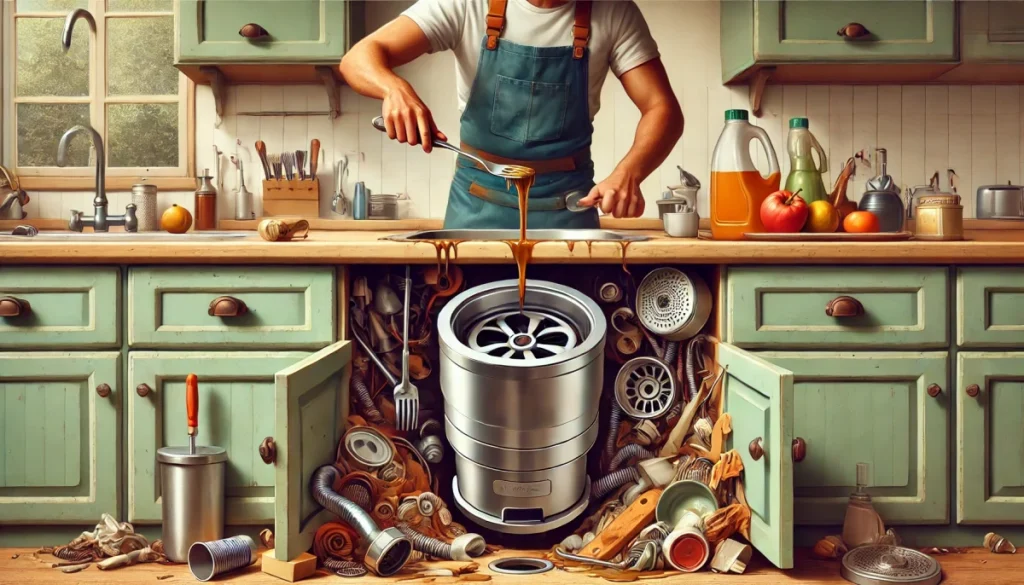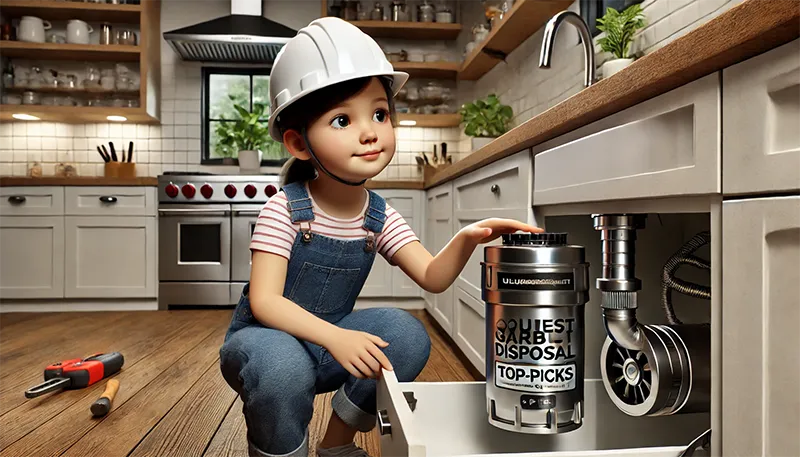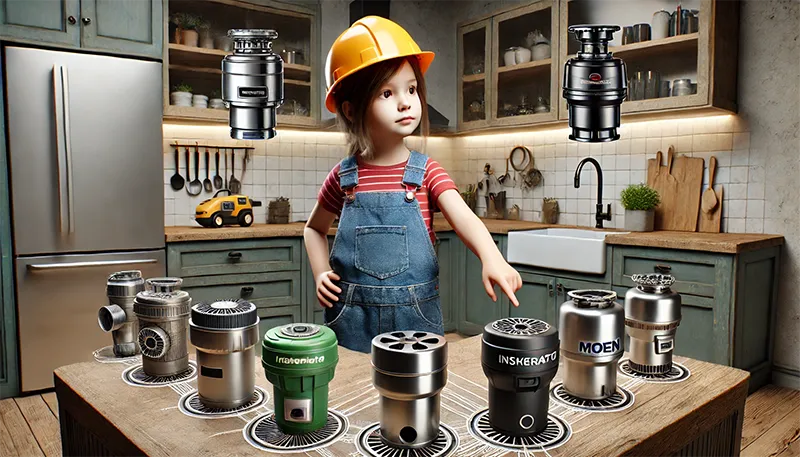Your garbage disposal is a hardworking appliance that makes kitchen cleanup easier by grinding up food waste and preventing clogs. But like all appliances, it doesn’t last forever. Recognizing the signs your garbage disposal needs replacing can save you from bigger problems down the line, like costly plumbing repairs or a complete kitchen malfunction.
Garbage disposals usually have a lifespan of around 8 to 15 years, but their efficiency and performance can start to decline earlier due to wear and tear, especially if they are used frequently. Issues such as strange noises, frequent clogging, or leaking water can be signals that it’s time to upgrade your garbage disposal. By catching these problems early, you can prevent the inconvenience of a breakdown right when you need your disposal the most.
In this article, we’ll walk through the most common signs your garbage disposal needs replacing and provide some helpful tips to ensure you’re not left with a kitchen disaster.
Unusual Noises Coming from the Disposal
One of the most obvious signs your garbage disposal needs replacing is the presence of unusual noises. Garbage disposals are not known for being completely silent, but they shouldn’t make loud grinding, rattling, or screeching sounds during operation. If your disposal suddenly starts making unfamiliar sounds, it’s time to pay attention.
There are several potential causes for these noises. Over time, the internal components of the disposal, such as the blades or impellers, can become damaged or loose. This can cause parts to move out of alignment, leading to that grinding or rattling noise you hear. In some cases, the motor itself may be wearing out, causing the disposal to struggle while breaking down food waste.
Sometimes, the disposal may produce loud noises if a non-food object accidentally falls into it, such as a utensil or a piece of plastic. If this happens, turn off the disposal immediately and carefully remove the object. However, if you clear the disposal and the noises persist, it’s likely that the motor or internal mechanisms are damaged, and this is one of the major signs your garbage disposal needs replacing.
Ignoring these sounds can lead to more serious problems, such as the disposal seizing up entirely or even damaging your plumbing. If the noise doesn’t go away after troubleshooting, it’s time to consider replacing your old unit with a new, more efficient model.
Frequent Resets or Power Issues
Another key indicator that your garbage disposal is on its way out is frequent power issues, such as having to hit the reset button often. The reset button on your garbage disposal is a safety feature that trips when the motor is overloaded or experiences an electrical issue. While an occasional reset may be normal, particularly after a large or tough load of food waste, having to reset the disposal frequently is a sign of deeper issues.
Frequent resets can indicate that the motor is struggling to handle the workload, which might be a sign of a failing motor. Over time, the motor’s ability to grind food waste efficiently diminishes, leading to frequent overloading and resets. Additionally, electrical issues or faulty wiring can also cause the disposal to lose power intermittently.
If your garbage disposal frequently loses power or resets itself, you should also inspect the electrical connections. Loose or frayed wires can lead to inconsistent performance and pose safety risks. While some electrical issues can be fixed, persistent resets are often one of the signs your garbage disposal needs replacing.
Ultimately, if you find yourself pressing that red reset button more often than usual, it’s likely time to consider replacing the disposal. Continuing to use a unit with frequent power problems can lead to more extensive electrical issues, potentially even damaging your home’s wiring or causing a safety hazard.
Persistent Clogs and Slow Draining
Garbage disposals are designed to break down food waste and prevent clogs in your sink’s plumbing, but if your disposal is clogging frequently or the water is draining slowly, it’s a clear indication that something is wrong. This is especially true if you’re following best practices—such as running cold water while using the disposal and avoiding putting fibrous or starchy foods down the drain—but still experiencing clogs.
Frequent clogs are often caused by dull blades that are no longer able to grind up food effectively. As a result, large food particles remain in the pipes, leading to blockages. If you’ve noticed that your garbage disposal is struggling to break down even soft food items or that clogs are becoming a regular occurrence, this is one of the signs your garbage disposal needs replacing.
Another issue that may arise is slow draining, where water takes a long time to clear from the sink even after running the disposal. This can occur when the disposal’s blades are worn down or when there is a blockage in the plumbing system caused by food waste that hasn’t been properly ground. If the water in your sink is consistently pooling and taking a long time to drain, it’s time to assess whether your disposal is still doing its job.
While occasional clogs can be fixed by cleaning the disposal or using a plunger, recurring clogs and slow drainage are clear signs that your disposal’s performance has significantly declined. Upgrading to a new model with sharper blades and more efficient grinding power will help eliminate this frustrating problem and keep your kitchen running smoothly.
Leaking from the Garbage Disposal
A leak under your sink can be a serious issue, and if the source of the leak is your garbage disposal, it may be a sign that it’s time to replace the unit. Garbage disposals can develop leaks for a variety of reasons, but the most common areas for leaks are the sink flange, the hose connections, or the body of the disposal itself.
If you notice water dripping or pooling under your sink, the first step is to inspect the disposal for cracks or damage. The most common source of leaks is the sink flange, where the disposal unit connects to the sink. Over time, the seal between the flange and the sink can weaken, leading to leaks. In some cases, this can be repaired by tightening the connections or applying fresh plumber’s putty to reseal the area.
However, leaks can also occur if the internal components of the disposal are damaged or if the unit has developed cracks. These types of leaks are more serious and typically require the disposal to be replaced. Ignoring a leak can lead to water damage to your cabinets, floors, and even electrical components under the sink, so it’s important to address the issue quickly.
Leaking is one of the clearest signs your garbage disposal needs replacing. If you’ve tried basic repairs but the leaks persist, it’s best to replace the unit before it causes significant damage to your home.
Foul Odors That Won’t Go Away
Garbage disposals can sometimes develop unpleasant odors, especially if food particles become trapped in the unit or the pipes. However, if you’ve cleaned your disposal thoroughly and the smell persists, it may be a sign that your disposal is no longer functioning properly.
Foul odors can occur when food waste isn’t being ground up completely, causing it to build up inside the disposal. Over time, this waste can decay and produce unpleasant smells that are difficult to get rid of, even with regular cleaning. Additionally, old or damaged disposals may have cracks or areas where food waste can get trapped, leading to the growth of bacteria and mold.
While there are many cleaning methods you can try—such as grinding up lemon peels or using a mixture of baking soda and vinegar—persistent odors are one of the signs your garbage disposal needs replacing. A new unit will grind food waste more efficiently and help prevent the buildup of smelly food particles.
Odors are not only unpleasant but can also indicate deeper issues within the disposal. If the smell doesn’t go away despite cleaning, it’s time to consider replacing the unit to keep your kitchen smelling fresh and clean.
Poor Performance or Inconsistent Grinding
If your garbage disposal is struggling to grind food effectively, or if it grinds inconsistently, this is a major red flag. A disposal that no longer performs well can be incredibly frustrating, as it leads to clogs, slow draining, and the need for frequent cleanings.
Over time, the blades in your garbage disposal can become dull, reducing the unit’s ability to break down food waste. This means that food may remain partially ground, leading to blockages in the pipes and inefficient waste removal. In some cases, the disposal may jam frequently, causing it to stop working altogether.
Inconsistent grinding is another one of the signs your garbage disposal needs replacing. If the disposal works well one day and poorly the next, it’s likely that internal components are wearing out. Replacing the disposal will not only restore its performance but also prevent future clogs and keep your kitchen running smoothly.
A high-performing garbage disposal should be able to handle most food waste efficiently, and if yours is struggling to keep up, it’s time to upgrade to a more powerful, reliable model.
The Disposal is More Than 10 Years Old
Age is one of the most telling signs your garbage disposal needs replacing. Most garbage disposals have a lifespan of 8 to 15 years, and once they reach the end of their life expectancy, they start to show signs of wear and tear. Older units may become less efficient, louder, and more prone to breakdowns.
As disposals age, their internal components can rust, corrode, or wear out, leading to reduced performance. In addition to poor grinding ability, older disposals may start to leak or develop electrical issues. While regular maintenance can extend the life of your disposal, once it reaches a certain age, replacement is usually the best option.
If your disposal is more than a decade old and you’re experiencing frequent problems, it’s time to consider upgrading. Newer models are more energy-efficient, quieter, and better equipped to handle modern kitchen waste. Replacing an old disposal can also save you money on frequent repairs and prevent potential plumbing issues.
FAQs
-
Can I repair a garbage disposal instead of replacing it?
In some cases, minor issues like clogs or small leaks can be repaired. However, if your garbage disposal is experiencing frequent malfunctions or major problems, such as persistent noise, power issues, or leaking, replacing the unit is often a better long-term solution.
-
What’s the average lifespan of a garbage disposal?
Most garbage disposals last between 8 to 15 years, depending on how frequently they are used and how well they are maintained. If your unit is approaching this age range and showing signs of wear, such as clogs or poor performance, it’s likely time to replace it.
-
Is it safe to continue using a malfunctioning garbage disposal?
No, continuing to use a faulty garbage disposal can lead to more serious problems, including leaks, electrical issues, or damage to your plumbing system. If your disposal is malfunctioning, it’s best to replace it to avoid further complications.
-
Why does my garbage disposal keep clogging even though I’m careful?
Frequent clogs can indicate that the blades in your garbage disposal are dull or that the motor is no longer powerful enough to grind food waste effectively. If you’re following best practices but still experiencing clogs, this is a sign that the disposal needs replacing.
-
Can an old garbage disposal increase my water bill?
Yes, inefficient or damaged garbage disposals can lead to slow drains and leaks, which waste water and may increase your water bill. Replacing an old, inefficient disposal can help reduce water waste and keep your utility bills in check.
Conclusion
Knowing the signs your garbage disposal needs replacing can help you avoid the inconvenience and cost of major plumbing issues. From strange noises and frequent clogs to persistent odors and leaks, these warning signals indicate that your disposal is nearing the end of its useful life. Replacing your garbage disposal with a new, more efficient model will not only improve your kitchen’s functionality but also prevent long-term damage to your plumbing.
If you’ve noticed any of these signs, it’s time to start shopping for a replacement. Upgrading your disposal before it completely fails will save you time, money, and the headache of dealing with a broken-down kitchen appliance.



